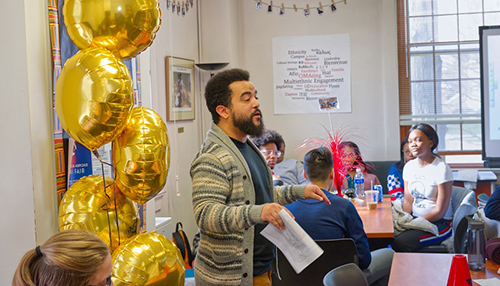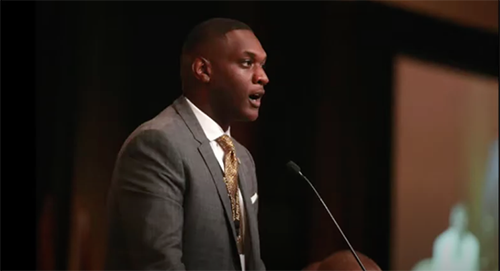Honoring the Maafa
The United States is a nation of immigrants. We’ve heard stories of our ancestors coming to the so-called “New World” from across the vast waters of the Atlantic Ocean, or from all over the world. Many of those ancestors came here willingly and on their own accord, but millions of others did not.
According to the Trans-Atlantic Slave Trade Database, during the era of the slave trade from 1525 to 1866, approximately 12.5 million people were kidnapped from Africa and sent across the Atlantic Ocean to be sold into slavery and involuntary servitude. While the slave trade is something that many are familiar with, there has been little done to commemorate and honor those who were forced to make the tragic journey across the ocean until recently.
To remember and honor those Africans who had to endure that journey, the Multi-Ethnic Education and Engagement Center (MEC) at UD implemented a week of commemoration and remembrance of this era in human history known as Maafa Commemoration Week.
The “Maafa” — a Kiswahili word that can translate to either “great disaster” or “great tragedy” — reflects on the plight of the Africans as they traveled across the Atlantic and serves as a reminder that many of them died along the way. According to Sam Ortiz, associate director for campus and community engagement at MEC, the Maafa can also be seen as a celebration as well.
“[Maafa Commemoration Week] is really an opportunity to commemorate and honor those who persevered and those who survived through their resilience,” he said. “It is a somber event, but it is also meant to be a celebration. A celebratory moment in that [Black Americans] are still here.”

Beginning Feb. 20, Maafa Commemoration Week starts with an abayomi doll-making workshop for students, faculty and staff. African women would often make abayomi dolls on slave ships to give to their children made out of fabric from their own skirts.
Throughout the week, there will be a poster exhibit in Alumni Hall where students are encouraged to walk through so they can be introduced to the Maafa and gain a better understanding of its history and how it continues its impact on the Black diaspora to this day. The week will then conclude with a commemoration service Thursday, Feb. 23, at the Adèle Center.
In recent years, there has been an increasing number of cities across the U.S. that have commemorated the Maafa, from New Orleans to San Francisco to Harrisburg, Pennsylvania. But the idea to have a week that commemorated the at UD began back in 2019 with just one man.
“I definitely want to recognize Dustin Pickett,” Ortiz said. “He really is the one who brought this to UD.”
Rev. Dustin Pickett, former campus minister for Christian diversity at UD, said he decided to bring a Maafa Commemoration Week to campus after a visit to Saint Paul Community Baptist Church in Brooklyn, New York.

“While visiting Saint Paul, I developed an appreciation for and deep connection to the Maafa Commemoration they held,” Pickett said. “Although the University of Dayton held similar remembrance services, the Maafa emphasized the need to acknowledge the harm and impact of slavery and the role of the Catholic Church in American chattel slavery. Knowing the Maafa, I felt it crucial to bring it to UD.”
This was a sentiment also shared by Ortiz.
“We don’t just want to teach this history,” he said. “We want to show our community that what we see around us is a direct result of our history.”
Ortiz said that he hopes students from all different backgrounds will come and attend the service and participate in the events throughout the week.
“We want all students — Black students, white students, brown students — to see and focus on the strength, the resilience and the creativity of these people,” he said.
Pickett will be a guest speaker during the Maafa commemoration service on Thursday, Feb. 23. He will be discussing how important the Maafa is in addressing the challenges Black Americans face to this very day.
“It is crucial to remember the Maafa to pay respect to the countless lives lost, families torn apart, and cultures destroyed during enslavement,” he said. “By remembering the Maafa, we can ensure these injustices are never repeated and work towards a world where all people are treated with dignity and respect.”